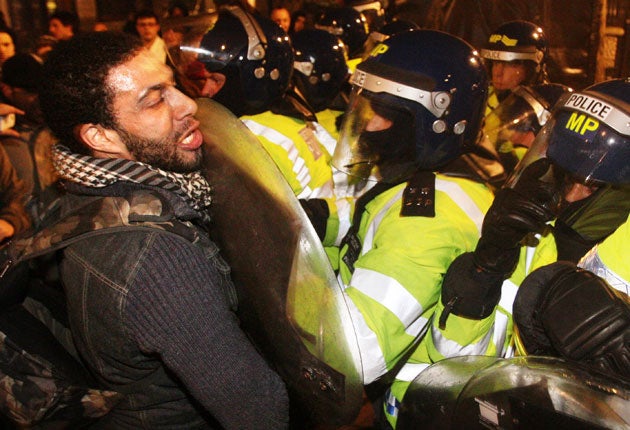Police 'far too ready to use kettling tactics'

Your support helps us to tell the story
From reproductive rights to climate change to Big Tech, The Independent is on the ground when the story is developing. Whether it's investigating the financials of Elon Musk's pro-Trump PAC or producing our latest documentary, 'The A Word', which shines a light on the American women fighting for reproductive rights, we know how important it is to parse out the facts from the messaging.
At such a critical moment in US history, we need reporters on the ground. Your donation allows us to keep sending journalists to speak to both sides of the story.
The Independent is trusted by Americans across the entire political spectrum. And unlike many other quality news outlets, we choose not to lock Americans out of our reporting and analysis with paywalls. We believe quality journalism should be available to everyone, paid for by those who can afford it.
Your support makes all the difference.Police are far too ready to consider "kettling" demonstrators, stoking up tensions between officers and peaceful protesters, the official report into Scotland Yard's handling of the recent anti-cuts rally has concluded.
Liberty was asked by the Metropolitan Police to act as observers on the handling of the TUC march in central London, but did not monitor separate protests by agitators at shops and banks.
It concludes that police officers' behaviour during the "March for the Alternative" was on "the whole proportionate". But it raises a series of concerns over police tactics and conduct, including serious communications breakdowns and the illegal confiscation of placards.
Police showed a "constant focus" on using the "fatally flawed" technique of kettling – in which marchers can be penned for hours in a confined area – to prevent infiltrators turning lawful protests into violence, according to the report, which is published today.
The Metropolitan Police was heavily criticised for the use of containment at last year's university tuition fee protests, and stopped short of deploying it during the anti-cuts demonstration of 26 March.
But Liberty says officers frequently seemed on the verge of ordering kettling, increasing tensions among marchers who feared they were about to be trapped in a confined area.
It said officers in the Met's special operations room sent "confusing and mixed" messages to colleagues on the ground on whether to kettle marchers, but there seemed to be a "continual expectation" that the technique would be used. It said: "The question seemed to be more 'when' than 'if'."
The observers added: "The possibility of mass containment of peaceful protesters has undoubtedly had a chilling effect on many people's rights to freedom of expression and assembly.
"Since containment is additionally such a blunt, resource-heavy and logistically difficult tactic to implement, we wonder why it has become such a favoured tactic in the policing of protest."
Liberty also raised concerns over the confiscation of a placard because it contained a swearword and over officers taking details of other protesters for the same reason. It questioned whether police acted lawfully in either case.
It reported that police ran into regular communications problems because of malfunctioning radios, with senior commanders forced to use mobile telephones to issue instructions.
Shami Chakrabarti, director of Liberty, said: "The preoccupation with 'kettling' and political pressure for knee-jerk public order powers continue to threaten the right to peaceful dissent in the oldest unbroken democracy."
Assistant Commissioner Lynne Owens, of the Met, said: "We were faced with the difficult task of striking the right balance between ensuring the vast majority of people were able to peacefully protest whilst managing the small number of criminals intent on disorder.
"We had officers along the whole route who could move in quickly, as the report recognises we did, to manage local break-outs of disorder."
Join our commenting forum
Join thought-provoking conversations, follow other Independent readers and see their replies
Comments